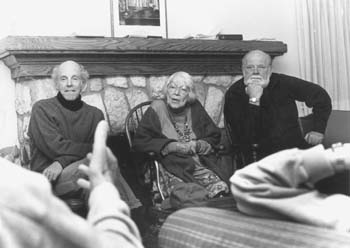Rebirth of Wonder
Penny From Heaven: Luminaries James Bierman (left), Mary Holmes and Paul Lee, leaders of the Penny University salon, gather weekly for inspired and intellectual conversation.
Long-running salon offers a penny for your thoughts
By Traci Hukill
CONVERSATION AT THE PENNY University, Santa Cruz's one true salon, has started on a personal note today. "So I always tell people, in order to have a happy marriage, either marry someone identical to you--or as close as possible--or else opposite you," Mary Holmes is chuckling as she winds up a story about her parents. "But don't muddy around with someone halfway like you!"
The two dozen attendees nod and laugh knowingly. Most of them are gray-haired, with the exception of a few women in their 30s and a young man with long blond hair. They've come to exchange opinions, to bounce ideas around like a group of people keeping a balloon aloft. Some bluster, some pontificate. Many have just come to listen, content to let others do the talking.
In fact, most people sit quietly, attentive as acolytes at a guru's knee. The room crackles with the intellectual energy of a few. At times it seems more like a lecture than anything else, though Holmes vehemently contests that it isn't. "It's just like if you give a dinner party," she says, "and you have interesting guests. Some of them don't care to talk, and others talk quite easily."
One of the people who talks the most easily is Holmes herself, who, with the late Page Smith and then-professor of philosophy Paul Lee, started the Penny University in 1974. Today the white-haired Holmes is flanked by Lee and James Bierman, a UCSC professor of theater arts.
The conversation takes an abrupt turn as Lee describes a Rudolf Steiner convention he attended on a recent trip to Washington, D.C. As he relates a Steiner recipe for good compost that involves burying a hollowed-out stag's horn pointed counterclockwise under the new moon, a few people start to squirm. In another age, Steiner's ideas would have been taken for witchcraft. In ours, they're taken for a different form of heresy, one that challenges our prized rationalism rather than Christian doctrine.
Finally one highly educated man--who earlier spent some time professing his allegiance to Newton's theory of light rather than Goethe's--can take it no longer. "I think this man's theories are insane!" he blurts. "And I would never send my child to one of his Waldorf schools!"
His outburst gives rise to a hubbub of guffaws, clucking and muttering in the room.
"Listen to him!" Lee exclaims in astonished delight, as if he's just stumbled upon a boy raised by wolves.
Holmes leaps on the man, leaning forward and focusing all her considerable energy on him. "What do you object to?" she demands. "There's nothing insane about his ideas. They're unusual, but they're not insane."
The Whole Nonselective Process Is the Secret
PROBABLY ONE REASON SO many people at this salon are so quiet is that they fear exchanges like these. They're not acrimonious confrontations, but to people untrained in discourse, they're intimidating, and those who have made a life's work of intellectual pursuits have an advantage over regular workaday folk. Or so it seems.
One thing our culture has forgotten how to do is cordially disagree, and salons, as any member will tell you, thrive on disagreement. Dale Bryant, a five-year member of a Los Gatos salon, has some funny stories about overbearing members like the elderly couple who turned every conversation to the subject of how they raised their children.
Still, when I suggest that Bryant's group might be more selective about its members, she balks. "Then you just have people who think alike," she says, "and that defeats the purpose."
As Holmes points out, the idea is not to constrict thought, but to expand it. "We don't come to any kind of conclusion," she says. "We just talk."
As the discussion at this evening's Penny University meanders from the death of beauty to the mathematical nature of music to the profound sorrow that shattered one member in the Holocaust Museum, it occurs to me that this is not about arguments, flashy shows of knowledge or the Truth. It's about wonder.
"Yes, wonder, exactly!" Holmes affirms. "Most of our group are retired people, some are from college. When you're young, you try to find out what it's all about, then you forget about that in mid-life. And then," she laughs, "when you get to be 50 or over 50, you start wondering what it's about again."
A salon like the Penny University fills a dire need for conversation in this time of fragmented families and frantic schedules. We're lucky it's there. But it points to our collective poverty of inspiring conversation while it satisfies the craving for it, and I walk away from the Monday night meeting wondering why we don't all just start having really good dinner parties.
Copyright © Metro Publishing Inc. Maintained by Boulevards New Media.

Robert Scheer
The Penny University meets every Monday (5-6pm) at Calvary Episcopal Church Parish Hall, 532 Center St., SC. It is free and open to the public. For more info, call 426-0845.
From the Nov. 6-12, 1997 issue of Metro Santa Cruz.
![[MetroActive Arts]](/arts/gifs/art468.gif)